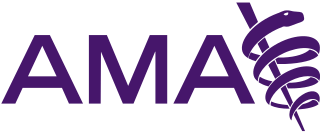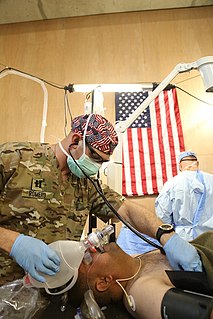Related Research Articles

The American Medical Association (AMA) is a professional association and lobbying group of physicians and medical students. Founded in 1847, it is headquartered in Chicago, Illinois. Membership was approximately 240,000 in 2016.

The Royal College of Physicians and Surgeons of Canada is a regulatory college which acts as a national, nonprofit organization established in 1929 by a special Act of Parliament to oversee the medical education of specialists in Canada.

A nurse anesthetist is an advanced practice nurse who administers anesthesia for surgery or other medical procedures. They are involved in the administration of anesthesia in a majority of countries, with varying levels of autonomy. Nurse anesthetists provide all services of anesthesia of the medication care for patients before, during, and after surgery. Certified Registered Nurse Anesthetists, (CRNA) are dedicated to give advanced profession of patient safety through experiences, collaboration of diverse ideas, advocacy, and professional development. In some localities, nurse anesthetists provide anesthesia to patients independently; in others they do so under the supervision of anesthesiologists. The International Federation of Nurse Anesthetists was established in 1989 as a forum for developing standards of education, practice, and a code of ethics.

The American College of Physicians (ACP) is a national organization of internists, who specialize in the diagnosis, treatment, and care of adults. With 161,000 members, ACP is the largest medical-specialty organization and second-largest physician group in the United States, after the American Medical Association. Its flagship journal, the Annals of Internal Medicine, is considered one of the five top medical journals in the United States and Britain.
Athletic training is an allied health care profession recognized by the American Medical Association (AMA) that "encompasses the prevention, examination, diagnosis, treatment, and rehabilitation of emergent, acute, or chronic injuries and medical conditions." There are five areas of athletic training listed in the seventh edition (2015) of the Athletic Training Practice Analysis: injury and illness prevention and wellness promotion; examination, assessment, diagnosis; immediate and emergency care; therapeutic intervention; and healthcare administration and professional responsibility.

An athletic trainer is a certified and licensed health care professional who practices in the field of sports medicine. Athletic training has been recognized by the American Medical Association (AMA) as an allied health care profession since 1990.

A paramedic is a healthcare professional, providing pre-hospital assessment and medical care to people with acute illnesses or injuries. In Canada, the title paramedic generally refers to those who work on land ambulances or air ambulances providing paramedic services. Paramedics are increasingly being utilized in hospitals, emergency rooms, clinics and community health care services by providing care in collaboration with registered nurses, registered/licensed practical nurses and registered respiratory therapists.

Medical education is education related to the practice of being a medical practitioner, including the initial training to become a physician and additional training thereafter.
Established in 1933, the American Board of Medical Specialties (ABMS) is a non-profit organization which represent 24 broad areas of specialty medicine. ABMS is the largest physician-led specialty certification organization in the United States.

Nurses in the United States practice nursing in a wide variety of specialties and departments.
The American Board of Internal Medicine (ABIM) is a 501(c)(3) nonprofit, self-appointed physician-evaluation organization that certifies physicians practicing internal medicine and its subspecialties. The American Board of Internal Medicine is not a membership society, educational institution, or licensing body.
Maintenance of Certification (MOC) is a recently implemented and controversial process of physician certification maintenance through one of the 24 approved medical specialty boards of the American Board of Medical Specialties (ABMS) and the 18 approved medical specialty boards of the American Osteopathic Association (AOA). The MOC process is controversial within the medical community, with proponents claiming that it is a voluntary program that improves physician knowledge and demonstrates a commitment to lifelong learning. Critics claim that MOC is an expensive, burdensome, involuntary and clinically irrelevant process that has been created primarily as a money-making scheme for the ABMS and the AOA.
The Federation of State Medical Boards (FSMB) of the United States is a national non-profit organization that represents the 71 state medical and osteopathic boards of the United States and its territories and co-sponsors the United States Medical Licensing Examination. Medical boards license physicians, investigate complaints, discipline those who violate the law, conduct physician evaluations, and facilitate the rehabilitation of physicians where appropriate. The FSMB's mission calls for "continual improvement in the quality, safety and integrity of health care through the development and promotion of high standards for physician licensure and practice."
The American Board of Nuclear Medicine (ABNM) certifies physicians as specialists in the practice of nuclear medicine. Diplomates of the ABNM are called nuclear medicine physicians. The ABNM is one of the 24 member boards of the American Board of Medical Specialties (ABMS).

The Society of Hospital Medicine (SHM) is a membership society for hospitalists, physicians, and other caregivers who practice the specialty of hospital medicine.
Clinical peer review, also known as medical peer review is the process by which health care professionals, including those in nursing and pharmacy, evaluate each other's clinical performance. A discipline-specific process may be referenced accordingly.
In the United States, certified anesthesiologist assistants (CAAs) are highly trained clinicians that practice medicine under the direction of licensed anesthesiologists to implement anesthesia care plans for a patient undergoing surgery. CAAs are integral members of the anesthesia care team as described by the American Society of Anesthesiologists (ASA). All CAAs possess a baccalaureate degree, and complete an intensive didactic and clinical program at a postgraduate level. CAAs are trained in the delivery and maintenance of all types of anesthesia care as well as advanced patient monitoring techniques. The goal of CAA education is to guide the transformation of student applicants into competent clinicians.
The American Association of Clinical Endocrinology (AACE), formerly known as the American Association of Clinical Endocrinologists, is a professional community of physicians specializing in endocrinology, diabetes, and metabolism. AACE's mission is elevating clinical endocrinology to improve global health. The association is headquartered in Jacksonville, Florida, US.
The American Association of Neuromuscular & Electrodiagnostic Medicine (AANEM) is a medical society for the medical subspecialty of neuromuscular and electrodiagnostic medicine based in the United States. Members are primarily neurologists and physiatrists—as well as allied health professionals and PhD researchers.
The American Board of Pathology (ABPath) is one of 24 member boards of the American Board of Medical Specialties. This organization was assembled in May 1936, under the approval of the Advisory Board for Medical Specialties (ABMS) and the American Medical Association (AMA) Council on Medical Education and Hospitals. It is the duty of the ABPath to grant certification in Anatomic Pathology, Clinical Pathology and/or Anatomic/Neuropathology to qualified Doctors of Medicine and Doctors of Osteopathic Medicine (M.D./D.O.).
References
- 1 2 Grace, E., E. Korinek and Z. Tran. Characteristics of Physicians Referred for a Competency Assessment: A Comparison of State Medical Board and Hospital Referred Physicians . Journal of Medical Regulation: Spring 2010, Vol. 96, No. 3.
- ↑ "Physician Characteristics and Distribution in the U.S.". American Medical Association.
{{cite web}}: Missing or empty|url=(help) - ↑ "About Coalition for Physician Enhancement (CPE)". Coalition for Physician Enhancement. Retrieved 17 March 2013.
- ↑ Korinek, B. and et al.Do Physicians Referred for Competency Evaluations Have Underlying Cognitive Problems? Academic Medicine : August 28, 2009, 84(8): 1015-1021.
- ↑ Grace, E., J. Kuperstein and N. Kirsch. Addressing Ethical Challenges Faced by Physical Therapists. Federation of State Boards of Physicians: Spring 2011.
- ↑ Elliott, V. AMA Seeks Clear Path for Doctors' Re-entry Into Medicine.. AMA: February 28, 2011.
- ↑ Sweeney, E. Physician Reentry: Reeducation Programs Help Integrate Medical Staff Members. Briefings on Credentialing: August 1, 2011.
- ↑ Elliott, Victoria. Physicians Reentering Clinical Practice: Characteristics and Clinical Abilities. AMA:February 28, 2011.
- ↑ Grace, E. and et al. AMA Seeks Clear Path for Doctors' Re-entry into Medicine. Journal of Continuing Education in the Health Professions: September 22, 2010, 31(1): 49-55.